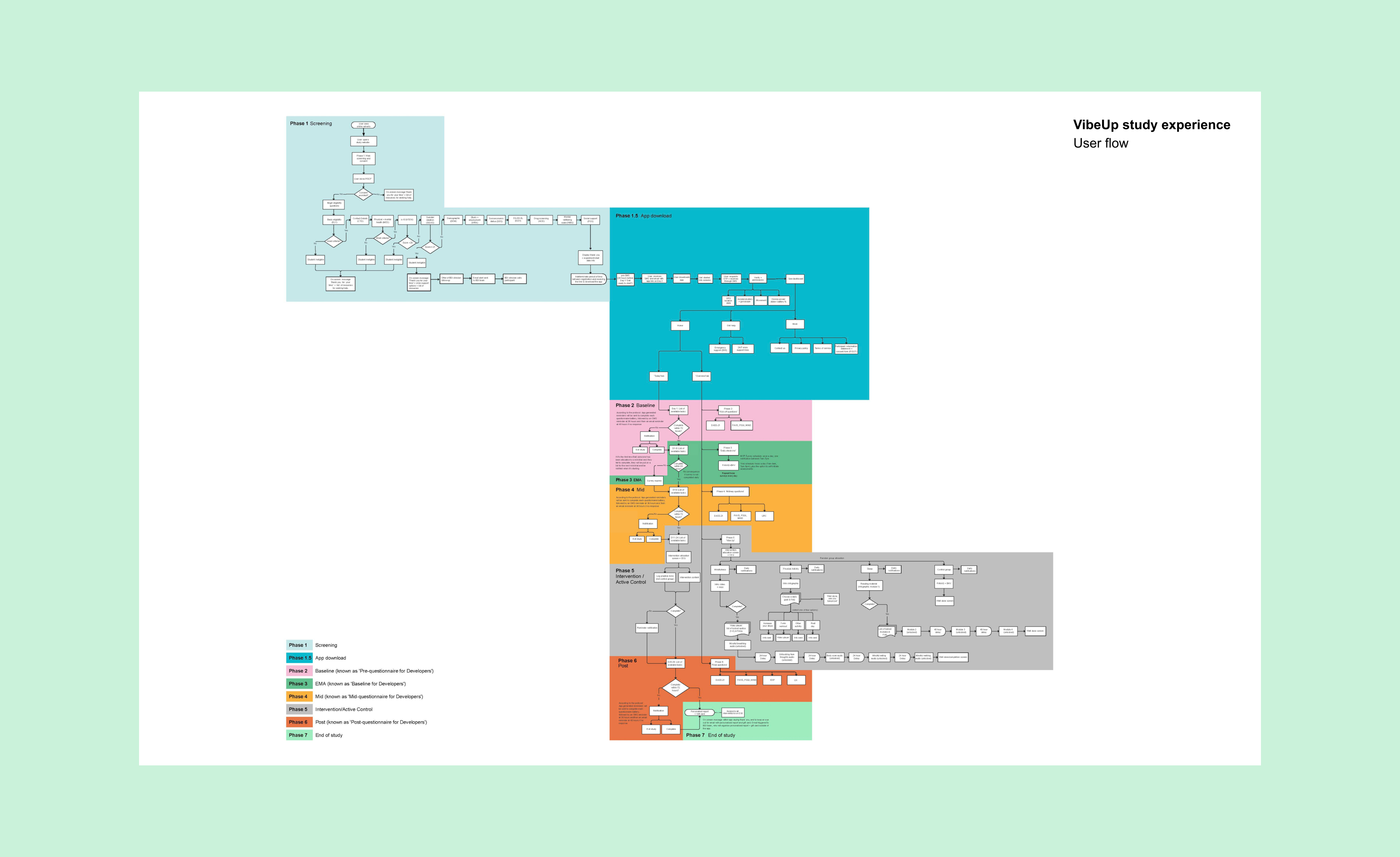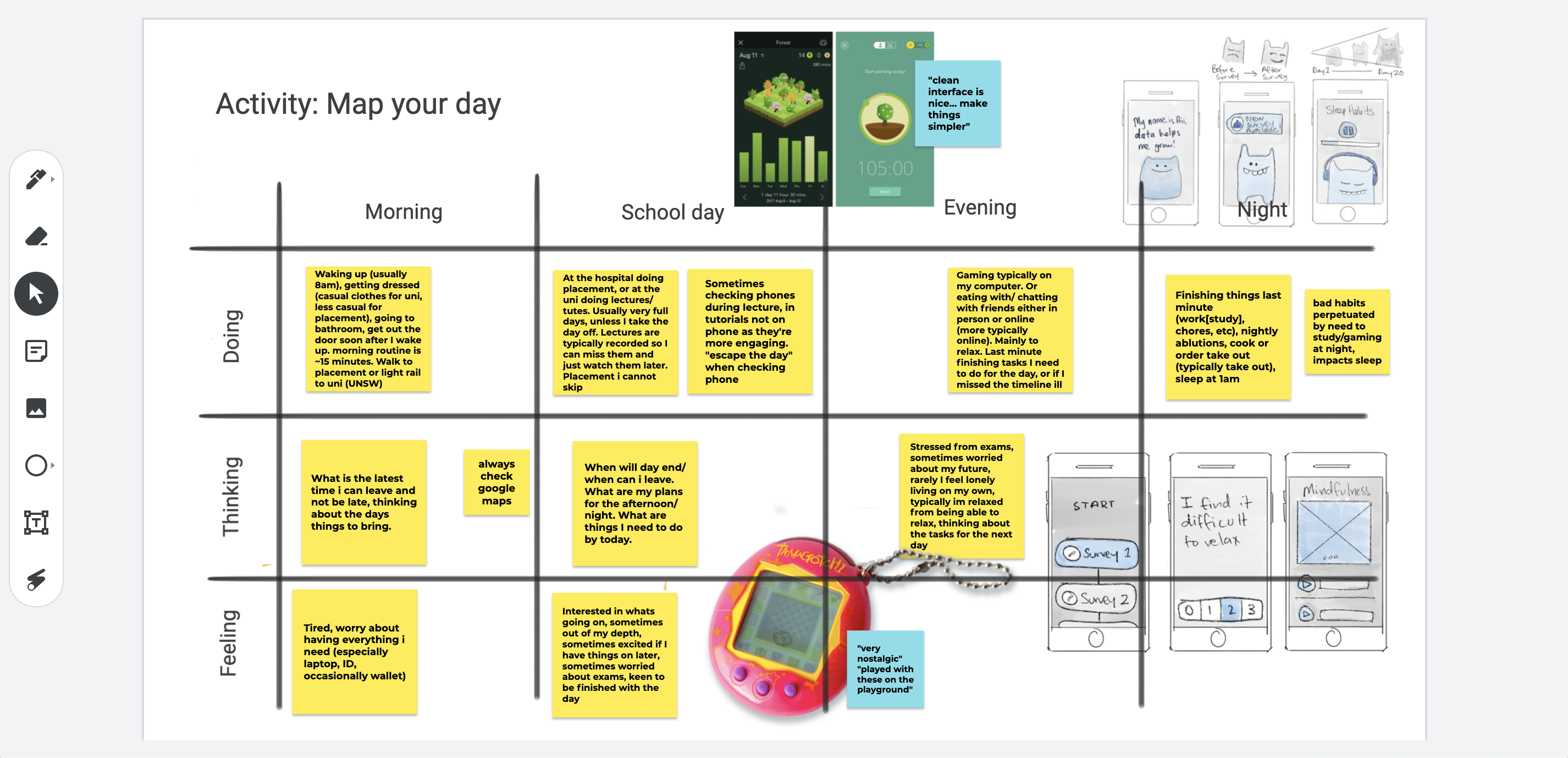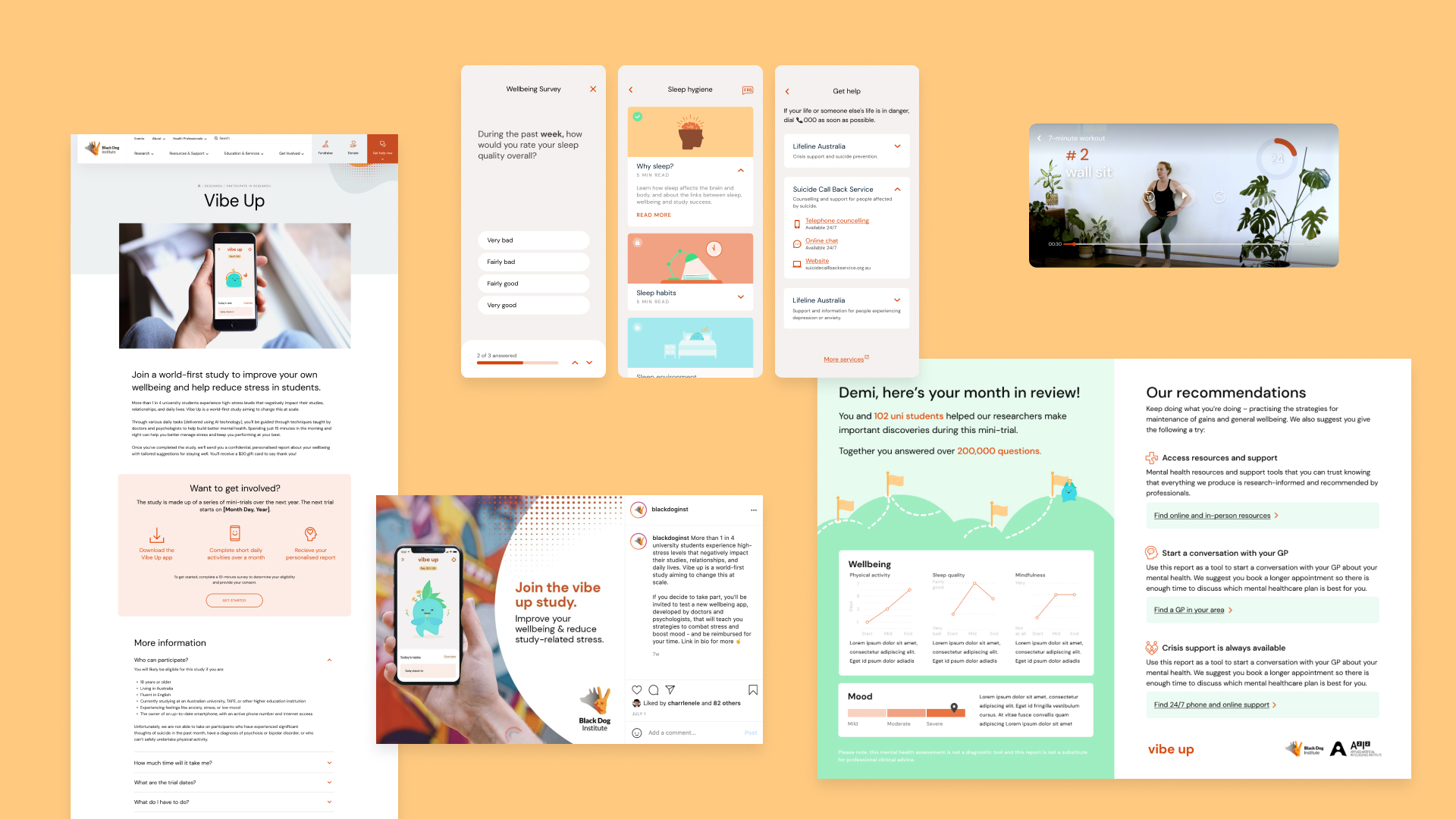Designing an app for a world-first study to improve wellbeing and help reduce stress in students
Project: Vibe Up app
Collaborators: Black Dog Institute and A2I2 at Deakin University
Role: UX/UI Designer
Date: October 2020 – August 2021
Study webpage ︎︎︎
Collaborators: Black Dog Institute and A2I2 at Deakin University
Role: UX/UI Designer
Date: October 2020 – August 2021
Study webpage ︎︎︎

Background
More than 1 in 4 university students experience high-stress levels that negatively impact their studies, relationships, and daily lives. Vibe Up is a world-first study aiming to change this at scale.
The Black Dog Institute are conducting an AI-response-adaptive randomised controlled non-inferiority trial of smartphone app-delivered self-care strategies for psychological distress in university students.
This smartphone app for university students aims to reduce distress and improve mental wellbeing through a brief two-week intervention of mindfulness, physical activity, or sleep hygiene. Although the three interventions use different treatment strategies, they are loosely matched on time and effort required by participants. The three interventions will be compared to an active control condition, in which participants are asked to monitor their mood throughout the day.
The Black Dog Institute are conducting an AI-response-adaptive randomised controlled non-inferiority trial of smartphone app-delivered self-care strategies for psychological distress in university students.
This is a novel approach that has only recently been introduced to limited health settings, in skin cancer and improving physical activity. It has yet to be trialled within the mental health realm.
Dr Leonard Hoon said, Senior Technical Product Manager at A2I2, and Vibe Up project lead.
Through Vibe Up, we aim to provide a richer and more streamlined healthcare experience, to help people get the most effective treatment as fast as possible.
Head of Clinical Research at the Black Dog Institute, and Vibe Up Study Lead, Associate Professor Jill Newby
This smartphone app for university students aims to reduce distress and improve mental wellbeing through a brief two-week intervention of mindfulness, physical activity, or sleep hygiene. Although the three interventions use different treatment strategies, they are loosely matched on time and effort required by participants. The three interventions will be compared to an active control condition, in which participants are asked to monitor their mood throughout the day.
Design challenge
The Research team engaged the Design team to offer support to manage and lead UX design process to deliver an end-to-end experience that enables participants to participate in the study.
Students are required to complete a screening survey in order to determine if they are eligible for the study.
Participants will be required to spend up to 30 minutes per day engaging with the app and its activities.
The study will last 3-4 weeks with the overall time commitment required for study activities, spread over that time, is about 8 hours.
Questions asked by the research team:
Students are required to complete a screening survey in order to determine if they are eligible for the study.
Participants will be required to spend up to 30 minutes per day engaging with the app and its activities.
The study will last 3-4 weeks with the overall time commitment required for study activities, spread over that time, is about 8 hours.
Questions asked by the research team:
- How might we get students to stick with the app for 4 weeks?
- How might we get students to do the app tasks (questionnaires and interventions)?
- How might we minimise perceived participant burden?
- How might we get people to change their behaviour with the interventions?
- How might we deliver feasible design proposals to Deakin tech team?

Approach
In order to develop an engaging and trauma-informed experience for university students while meeting the requirements of the study design, a deep understanding of daily habits and device usage was initially established. In order to endear the app to participants, we then needed to understand how to motivate and streamline their experiences during the study period.
![]()
Discovery Phase:
Identify and contextualise opportunities within the problem-space, 4 rounds of 1:1 online testing with 34 users recruited through Askable platform. Co-design sessions were run to develop concepts alongside surveys and card-sorting activities.
Synthesis phase:
A collaborative process of sense-making of all the gathered data which results in a strategy for user experience and creative direction.
Design and development phase:
Testable prototypes are produced at this phase as a result of the solutions developed from the previous phases. Collaboration between the design, research and tech teams are important to ensure feasibility and correct implementation.

Discovery Phase:
Identify and contextualise opportunities within the problem-space, 4 rounds of 1:1 online testing with 34 users recruited through Askable platform. Co-design sessions were run to develop concepts alongside surveys and card-sorting activities.
Synthesis phase:
A collaborative process of sense-making of all the gathered data which results in a strategy for user experience and creative direction.
Design and development phase:
Testable prototypes are produced at this phase as a result of the solutions developed from the previous phases. Collaboration between the design, research and tech teams are important to ensure feasibility and correct implementation.
Outcome
The study is currently in progress with mini-trials begining from November 2021 and continuing until November 2022.

Design team
Adryon Joubert-de Villiers, Design Manager
Marya Bautista, UX/UI Designer
Jenny Vuu, Design Researcher
Matt Lee, Illustrator and Animator
Marya Bautista, UX/UI Designer
Jenny Vuu, Design Researcher
Matt Lee, Illustrator and Animator